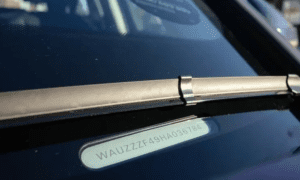Are you confident that your auto insurance policy has got you covered? Or do you feel like you’re driving blind, unaware of the potential gaps in your coverage? Whether you purchased your policy years ago or just recently, regularly reviewing and revising it is vital to ensure maximum protection on the road. In this blog post, we’ll dive into the importance of keeping a close eye on your auto insurance policy and why making it a habit could save you from unnecessary headaches in the future. So buckle up and let’s get started!
Introduction: The Purpose of Auto Insurance
Auto insurance is a type of insurance that is designed to protect drivers against financial loss in the event of an accident, theft or damage to their vehicle. It provides coverage for damages and injuries caused by you or someone else while operating your vehicle. In many countries, including the United States, auto insurance is required by law for all drivers.
The main purpose of auto insurance is to provide financial security and peace of mind for drivers. Accidents can happen at any given moment, no matter how cautious a driver may be. Without proper insurance coverage, individuals could face significant financial burdens such as paying for vehicle repairs and medical bills out-of-pocket. This could result in severe financial strain and even bankruptcy for some individuals.
In addition to providing financial protection, auto insurance also plays a vital role in protecting others on the road. In case of an accident where you are found responsible, liability coverage within your auto policy will cover damages or injuries sustained by others involved in the accident. This protects not only other drivers but also pedestrians and property owners who may have been affected by the accident.
Why Regularly Reviewing Your Policy Is Important
Regularly reviewing your auto insurance policy is an essential aspect of responsible car ownership. It ensures that you have adequate coverage for any unforeseen circumstances and helps you save money by avoiding unnecessary expenses in the long run.
Here are some compelling reasons why regularly reviewing your auto insurance policy should be a top priority:
1. Changes in Your Driving Habits and Lifestyle: Life is constantly changing, and so are your driving habits. Perhaps you used to commute to work daily, but now you’re working from home. Or maybe you’ve moved to a different state with different road conditions or traffic patterns. Any significant changes in your driving habits or lifestyle can impact your insurance needs, making it necessary to review your policy regularly.
2. Changes in Your Vehicle: Just like how people’s lifestyles change, so do their vehicles. You might buy a new car or make upgrades to your existing one, which could affect the amount of coverage needed for adequate protection. For example, if your vehicle has advanced safety features like lane departure warning systems or anti-collision technology, it may qualify for discounts on your premium.
3. Policy Discounts and Savings: Insurance providers offer various discounts and savings opportunities that may not have been available when you first purchased your policy. By reviewing your policy, you can identify these discounts and potentially save money on premiums.
4. Re-Evaluate Coverage Limits: As time goes by, the value of our assets tends to increase; therefore, re-evaluating the coverage limits on our auto insurance becomes necessary to ensure that we have enough coverage to protect our assets in case of an accident.
5. Unforeseen Changes in Insurance Rates: Even if your driving habits have not changed, the insurance rates may change due to factors such as inflation and the overall market. By reviewing your policy regularly, you can stay informed about any rate changes and adjust your coverage accordingly.
6. Ensure You’re Covered for All Your Needs: Over time, new insurance offerings and add-ons may become necessary to enhance your protection. For instance, if you travel a lot for work or leisure, adding roadside assistance coverage may be beneficial in case you get into an accident while on the road.
7. Avoid Lapses in Coverage: A lapse in auto insurance coverage can result in significant expenses down the road when you renew your policy or file a claim. Regularly reviewing your policy will help ensure that there are no lapses in coverage and keep you protected financially.
Changes in Your Life that Impact Coverage Needs
As we go through life, our circumstances and priorities change. Whether it’s starting a family, changing jobs, or moving to a new location, these changes can have a significant impact on our auto insurance needs. It is essential to regularly review your auto insurance policy to ensure that you have adequate coverage for any potential risks and meet your current needs.
1. Changes in Driving Habits: As we grow older and move through different stages of life, our driving habits also change. For instance, if you used to drive long distances for work but now work from home, you may be eligible for lower mileage discounts on your policy. On the other hand, if you’ve recently started commuting longer distances for a new job or have added a teenage driver to your policy, it may be time to increase your coverage limits.
2. Purchasing or Selling a Vehicle: Buying a new car is an exciting experience; however, it’s essential to inform your insurance provider immediately about the purchase. Depending on the type of car you buy (e.g., luxury vehicle vs. economy car), there can be significant differences in insurance rates. Additionally, if you plan on selling one of your vehicles or downsizing from multiple cars to one shared vehicle within the household, this will also impact your overall coverage needs.
3. Change in Location: If you’ve moved to a new state or even just expanded within the same city/region, it’s crucial to update this information with your insurer as soon as possible. Different states have different insurance requirements, and your rates may change based on where you live. Additionally, if you’ve moved to a location with a higher cost of living, this may also impact your coverage needs.
4. Adding or Removing Drivers: If someone in your household has had their driver’s license revoked or a member of the family moves out, you’ll want to inform your insurance provider about these changes. Similarly, there may be instances when you need to add another driver to your policy, such as when a teenager gets their license or when an elderly parent moves in with you.
5. Starting a Family: As a new parent, it’s essential to review your auto insurance to make sure that each member of your family is adequately covered. Depending on your carrier and state laws, adding a teenage driver (and even adding a child as young as 16) can significantly impact premiums. On the other hand, if you no longer require this level of coverage because your children have left home for college or work, this could open up ways for savings.
Discounts and Savings Options
Discounts and Savings Options are an important aspect of any insurance policy, especially when it comes to auto insurance. As a driver, it is crucial to regularly review your policy in order to make sure you are taking advantage of all the available discounts and savings options. In this section, we will discuss some common discounts and savings options that you should be aware of when reviewing your auto insurance policy.
1. Multi-Car Discount:
If you own more than one car and insure them both under the same policy, many insurance companies offer a multi-car discount. This can result in significant savings on your premium payments each year.
2. Good Driver Discount:
Having a clean driving record can not only save you from potential accidents, but it can also lead to a good driver discount on your auto insurance premium. Insurance companies often reward safe drivers with lower rates as they are considered less risky to insure.
3. Low Mileage Discount:
If you don’t drive very often or have a shorter commute to work, you may qualify for a low mileage discount on your auto insurance policy. This means that if you drive under a certain number of miles per year (usually 7,500-12,000), you could receive lower rates as the likelihood of being involved in an accident decreases.
4. Bundling Discounts:
If you have other types of insurance – such as home or life – with the same company providing your auto insurance coverage, bundling these policies together could result in significant discounts on all policies.
Understanding Coverage Levels and Limits
When it comes to auto insurance, many people may just focus on the cost of their premiums and forget to consider the specifics of their coverage levels and limits. However, understanding these factors is crucial in ensuring that you have adequate protection in case of an accident or other unforeseen event.
Coverage levels refer to the maximum amount your insurance provider will pay out for a particular type of coverage. For instance, if you have liability coverage with a limit of $50,000, this means that the maximum amount your insurer will cover for any damages or injuries caused by you in an accident is $50,000.
It’s important to note that each state has its own minimum required coverage levels for auto insurance. These minimums may not always be enough to fully protect you in case of a serious accident. Therefore, it’s essential to review your policy and consider increasing your coverage limits if necessary.
On the other hand, coverage limits determine the maximum amount your insurance provider will pay per occurrence or claim. For example, if you have collision coverage with a limit of $25,000 and are involved in three separate accidents within one year, your insurer will only cover up to $25,000 for each incident.
To better understand how much coverage you need and what limits are appropriate for your situation, it’s essential to think about various factors such as the value of your vehicle and assets. If you own expensive assets like a home or business, it’s advisable to have higher liability limits since these assets could be at
The Risks of Not Reviewing Your Policy
When it comes to your auto insurance policy, it’s important to not just set it and forget it. The reality is that life is constantly changing, and so are your insurance needs. Failing to review and update your policy can have serious consequences in the event of an accident or other unforeseen circumstances.
One of the main risks of not regularly reviewing your auto insurance policy is being underinsured. If you haven’t updated your coverage in a while, there’s a good chance you may not have enough coverage for your current situation. For example, if you’ve added a new car to your household, but failed to inform your insurance company, that vehicle may not be covered in the event of an accident. This could leave you on the hook for expensive repairs or medical bills.
Another risk is overpaying for coverage that you no longer need. As time goes on, some aspects of your policy may become less relevant or necessary. For instance, if you originally had full coverage on an old car that is now paid off and worth significantly less than when you first insured it, dropping some of those extra coverages could save you money each month.
Furthermore, failing to review your policy could also result in gaps in coverage. You may assume that certain situations are covered by your insurance without realizing that they are actually excluded from your policy or require additional coverage. This can leave you vulnerable in unexpected scenarios such as accidents involving uninsured drivers or natural disasters.
Tips for Conducting a Policy Review
Conducting a regular policy review for your auto insurance is crucial in ensuring that you have the proper coverage and protection in place. As life changes, your insurance needs may also change. Therefore, it is important to conduct a thorough review of your policy at least once a year, or whenever there are significant changes in your life or driving habits.
Here are some tips to keep in mind when conducting a policy review:
1. Understand Your Coverage: The first step in conducting a policy review is to understand what is covered under your current auto insurance policy. This will help you determine if there are any gaps in coverage that need to be addressed. Make sure you know the details of your liability coverage, collision and comprehensive coverage, and any other add-ons or endorsements you may have.
2. Review Your Deductibles: Take note of the deductibles listed on your policy for different types of coverage. Higher deductibles can lead to lower premium costs but make sure they are still affordable for you in case of an accident.
3. Assess Any Changes in Lifestyle: Any big changes in your lifestyle such as getting married, having children, changing jobs, or moving to a new location can all impact your auto insurance needs. For example, if you move from the city to a more rural area with less traffic and lower crime rates, this could potentially lead to lower premiums.
4. Consider Mileage Changes: If you have significantly changed how much you use your car since the last time you reviewed your policy, make sure to update your insurance company. Driving fewer miles can often result in lower premiums.
5. Review Discounts: Check with your insurance provider to see if you are eligible for any new discounts that may have become available since you last reviewed your policy. These could include safe driver discounts, good student discounts, or bundling discounts for having multiple policies with the same insurer.
6. Assess Your Driving Record: Your driving record is a key factor in determining your auto insurance rates. It is important to review any recent tickets or accidents and understand how they may be affecting your premiums.
7. Consider Changes in Your Vehicle: If you have purchased a new car or made significant modifications to your existing vehicle, it may affect your coverage needs and premium costs. Make sure to update this information with your insurance company.
8. Compare Quotes from Other Insurers: As part of your policy review, it can be beneficial to compare quotes from other insurers to see if you are still getting the best deal on your coverage. Keep in mind that price should not be the only factor when choosing an insurer – make sure to also consider their reputation and customer service.
Conclusion
In conclusion, regularly reviewing your auto insurance policy is crucial for protecting yourself and your assets in case of any accidents or damages. By understanding the coverage options and reassessing them periodically, you can ensure that you have the right amount of protection for your needs at a reasonable cost. Don’t make the mistake of neglecting this important aspect of financial planning – take the time to review your auto insurance policy today and make any necessary adjustments to ensure peace of mind on the road. Your future self will thank you.



































